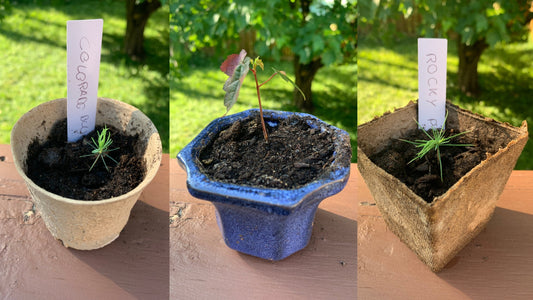Ikigai, the Japanese concept of finding what makes us happy in our daily lives, is often presented as a personal quest. Yet, it's not just a matter of passion or vocation: it's also a balance to be cultivated while avoiding certain pitfalls.
If you feel like you're going around in circles, lacking energy, or never finding what truly excites you, it may be time to look at what's holding you back. Here are five common obstacles that keep you from your ikigai.
1. How much time do you spend on screens? 📱🖥️
Netflix, social media, incessant notifications... Screens have become ubiquitous and can easily eat into our time without us realizing it. But be careful, not all screen time is necessarily "wasted" time!
Some platforms offer enriching content: inspiring films, captivating documentaries, series that move us and make us feel strong emotions. The real problem is the time spent on “useless” screens, those that provide neither learning, inspiration, nor deep pleasure.

👉 Ask yourself: how much time do you spend on social media each day? Add that time up... If you spend more than 45 minutes a day , that's more than 5 hours a week .
Imagine what you could do with those 5 hours:
- Do sports → 5 hours a week, and you would become excellent at something.
- Sleep more → 5 more hours of sleep per week, and you would be much more rested and happier.
- Learn something new → A course, a hobby, an artistic practice…
💡 Tip : Use a screen time tracker to identify apps that are wasting your time, and set limits to gradually reduce them. And like any change, don't be excessive; don't go from 2 hours a day to 15 minutes; you have to keep it up!
2. Why do you say “yes” to every invitation? 🎉🤯
Weddings, baptisms, birthdays, dinners with friends, professional events... Our diaries are often filled with social obligations, to the point where we can sometimes feel overwhelmed rather than fulfilled.
A telltale sign? If your partner asks you why you're going to an event and your answer begins with "we have to," for example: "We have to go, honey, they're our friends!"

This should be a red flag. Why should you go? Do you genuinely enjoy participating, or is it just social pressure? Do you really think that if you don't go to your neighbors' third child's 6th birthday party, they won't talk to you anymore?
Take a moment to analyze your weekends and vacations:
- Have you filled your schedule with social gatherings “because you have to be busy”?
- Or have you also planned for moments of emptiness, where you have the freedom to do whatever you want, or even to do nothing at all?
Happiness isn't always found in a busy schedule. Allowing yourself to decline invitations and create moments of respite also shows respect for yourself. We're social beings, but don't overdo it!
💡 Tip : Before accepting an invitation, ask yourself this question: “Do I want to go or am I afraid of disappointing someone by refusing?”
3. Are you taking care of your wellness triangle: sleep, diet, movement? 😴🥗🏃♂️
Yes, yes, we know, it's the classic trio we hear everywhere: sleep well, eat well, move well. And yet... we're going to repeat it anyway, because it's a fundamental pillar of well-being and ikigai!
🔹 Sleep: the basis of everything
It can't be stressed enough: lack of sleep makes you more irritable, decreases your concentration, and can seriously impact your happiness. A recent study even showed that sleep deprivation significantly reduces your ability to experience pleasure and manage stress ( source ). So, if you're having a string of short nights, perhaps it's time to reassess your priorities?
🔹 Food: your daily fuel
An unbalanced meal can lead to fatigue, mood swings, and an overall lack of energy. Eating healthy doesn't mean depriving yourself; it means choosing foods that nourish your body and mind.
🔹 Sport: much more than a question of physical fitness
We're not asking you to run a marathon, but incorporating a little physical activity into your week can do wonders. Moving releases endorphins, the famous happy hormones, and improves your mental well-being.
A little self-analysis exercise:
- Did you sleep at least 8 hours last night?
- Did you eat fresh, balanced foods today?
- Have you done any minimum exercise this week? - 3 hours per week or at least 30 minutes of walking per day.
If the answer is “no” to several of these questions, this may be where you need to look for a source of discomfort… and make small, gradual changes!
💡 Tip : Try a simple improvement for a week (going to bed 30 minutes earlier, walking 20 minutes a day, adding more vegetables to your meals) and see the impact on your energy and mood. Small, consistent changes are often the ones that last the longest!
4. Do you have enough leisure and fun moments in your daily life? 🎨🎸🌱
Work, obligations, routine... and what's your joy in all of this? Having a hobby is more than just a pastime: it's a breath of fresh air for your mind, a way to refocus and cultivate your daily happiness.
We've already covered this in detail in our article Finding a Creative Hobby to Beat Boredom , but here's a reminder: Doing something just for fun (and not out of obligation or productivity) boosts your well-being and sense of accomplishment.

Some ideas for incorporating more leisure into your life:
- Take care of a bonsai with our Bonsai Box : spending 5 minutes a day observing and caring for a miniature tree is giving yourself a moment of serenity and mindfulness.
- Try Japanese embroidery with our Temari Box : creating a Temari ball requires patience and creativity, while creating a unique gift that will bring luck to your loved ones.
💡 Tip : Block off a slot in your calendar dedicated to a hobby, just like you would a meeting or a workout. It's not wasted time, it's time for you!
5. Do you get out of your routine enough to discover new things? 🔄
Ikigai isn't found by staying still. If your daily life feels like a repetitive loop and you never try anything new, you risk missing out on unsuspected passions.
Ask yourself: When was the last time you tried something new? A class, a workshop, a different outing… Stepping outside your comfort zone often leads to unexpected sources of joy.

💡 Tip : Set yourself a challenge every month: try a new hobby, visit an unknown place, meet new people, walk more... Ikigai often comes from experimentation!
Conclusion
Finding your ikigai isn't a sudden revelation, but rather a constant process of adjustment. Take the time to observe what's holding you back, and start making space for what truly feels good.
Which brake speaks to you the most? Share in the comments which one you'd like to work on today! 💬✨




